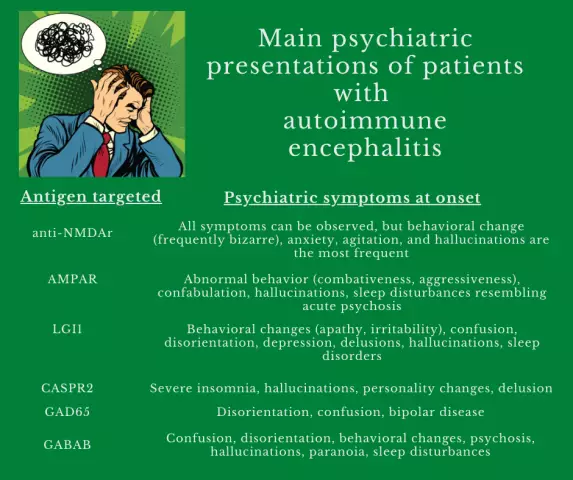- Author Curtis Blomfield blomfield@medicinehelpful.com.
- Public 2023-12-16 20:44.
- Last modified 2025-01-23 17:01.
Encephalitis is an inflammatory process that occurs in the gray or white matter of the brain. It can be caused by a virus, a bacterial process, and even an allergic reaction to an administered serum or vaccine. Symptoms of encephalitis infection can appear unexpectedly when there was no vaccination, no insect bite, or other apparent cause. These may be the so-called sclerosing panencephalitis or Economo's encephalitis, the causes of which have not yet been established.

The most famous is tick-borne encephalitis, the symptoms of which appear 8-18 days after a tick bite. If the bite fell on the head and neck area, then the incubation period is shorter - up to 7 days. And even after 4 days a person can feel the first signs of the disease.
The most dangerous and disabling is encephalitis caused by the herpes simplex virus, the symptoms of which may appear 5-14 days after the initial entry into the body or another exacerbation of this infection against the background of a strong decrease in immunity.
Measles, rubella and varicella encephalitis have their own incubation period, after which signs of the disease itself first develop (fever, rash), and only then, after 5-7 days, do the first symptoms of encephalitis appear.
Purulent encephalitis can occur against the background of untreated manifestations of purulent otitis media, pneumonia, osteomyelitis or other diseases caused by a bacterial factor.
If vaccinated, encephalitis can develop on days 9-11 (after smallpox vaccination) or from day 10 to several months (after rabies vaccination).

How encephalitis manifests itself. Symptoms of the infectious process:
1. Such encephalitis usually begins with prodromal phenomena: cough, sore throat, runny nose. There may be a rash and other manifestations characteristic of chickenpox, measles or rubella, or a purulent process will precede the disease.
2. The first symptoms of encephalitis: a severe headache, which is usually localized in the frontal region or captures the entire head. It is aggravated by turning the head, sudden movements. It is often accompanied by nausea and vomiting, and the latter can be sudden, without nausea, profuse, and after it does not get better.
3. The appetite decreases, and it is often impossible to drink the patient. Adult patients, being conscious and realizing that it is necessary to drink, are afraid to do so because of nausea or vomiting.
4. Weakness and drowsiness increase.
5. Dizziness.
6. Photophobia.
These signs are very similar to those of meningitis, and isolated meningitis can only be distinguished from encephalitis or meningoencephalitis by MRI.

Indicate encephalitis symptoms are:
- convulsions, often with respiratory arrest, recurring;
- a person can become inadequate, aggressive, then drowsiness increases up to coma;
- sometimes drowsiness increases so quickly that after 6-8 hours the patient cannot be woken up;
- there may be respiratory disorders: frequent (more than 20 per minute) or, conversely, rare (8-10 per minute), you can sometimes notice that the intervals between breaths are unequal;
- strabismus;
- unsteady gait;
- numbness in limbs, goosebumps;
- difficulty urinating when there is an urge, but you can’t go to the toilet;
- paralysis or paresis (incomplete paralysis);
- violation of swallowing;
- asymmetry of the face and pupils also indicate encephalitis;
- there may be other manifestations of encephalitis, such as hearing or vision loss.
For yourself, you need to remember the following: if such symptoms appear against the background of normal temperature, it rises only later, this may mean that a person has a stroke. These diseases are often distinguished only by lumbar puncture and MRI.






